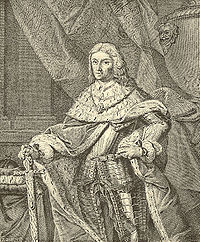
Frederick I, Elector Palatine
Encyclopedia


Heidelberg
-Early history:Between 600,000 and 200,000 years ago, "Heidelberg Man" died at nearby Mauer. His jaw bone was discovered in 1907; with scientific dating, his remains were determined to be the earliest evidence of human life in Europe. In the 5th century BC, a Celtic fortress of refuge and place of...
– 12 December 1476, Heidelberg
Heidelberg
-Early history:Between 600,000 and 200,000 years ago, "Heidelberg Man" died at nearby Mauer. His jaw bone was discovered in 1907; with scientific dating, his remains were determined to be the earliest evidence of human life in Europe. In the 5th century BC, a Celtic fortress of refuge and place of...
) was a Count Palatine of the Rhine and Elector Palatine from the House of Wittelsbach in 1451 - 1476.
He was a son of Louis III, Elector Palatine
Louis III, Elector Palatine
Louis III, Count Palatine of the Rhine , was an Elector Palatine of the Rhine from the house of Wittelsbach in 1410–1436....
and his second wife Matilda of Savoy. His maternal grandparents were Amadeo, Prince of Achaea
Amadeo, Prince of Achaea
Amadeus or Amedeo of Savoy was the son of James of Piedmont and his third wife Marguerite de Beaujeu. By James' will of 16 May 1366, he was declared his firstborn and heir. In 1367, he succeeded his father in his titles of Lord of Piedmont and Prince of Achaea...
and his wife Catherina of Geneva.
He ruled the Electoral Palatinate after the death of his brother Louis IV
Louis IV, Count Palatine of the Rhine
Louis IV, Count Palatine of the Rhine was an Elector Palatine of the Rhine from the House of Wittelsbach in 1436 - 1449....
as regent for his nephew Philip, Elector Palatine
Philip, Elector Palatine
Philip the Upright, Elector Palatine of the Rhine was an Elector Palatine of the Rhine from the house of Wittelsbach from 1476 to 1508....
. He adopted his nephew in 1451 and refused to marry. From this "Arrogation," he claimed the right to be the legitimate elector. As this action was against imperial law, Emperor Frederick III
Frederick III, Holy Roman Emperor
Frederick the Peaceful KG was Duke of Austria as Frederick V from 1424, the successor of Albert II as German King as Frederick IV from 1440, and Holy Roman Emperor as Frederick III from 1452...
refused to confirm Frederick's status. However, the emperor did not manage to displace Frederick who was an able strategist and allied with Louis IX, Duke of Bavaria
Louis IX, Duke of Bavaria
Louis IX , was Duke of Bavaria-Landshut from 1450. He was a son of Henry XVI the Rich and Margaret of Austria.-Biography:Louis succeeded his father in 1450...
.
Frederick was also successful against other opponents such as the emperor's party follower Albert III, Elector of Brandenburg
Albert III, Elector of Brandenburg
Albert III , often known simply as Albert Achilles , was a Prince-elector of the Margraviate of Brandenburg. He received the nickname Achilles because of his knightly qualities. He also ruled the Principality of Ansbach.-Early life:Albert was born the third son of Elector Frederick I in Tangermünde...
and Dieter von Isenburg, the archbishop of Mainz
Archbishopric of Mainz
The Archbishopric of Mainz or Electorate of Mainz was an influential ecclesiastic and secular prince-bishopric in the Holy Roman Empire between 780–82 and 1802. In the Roman Catholic Church hierarchy, the Archbishop of Mainz was the primas Germaniae, the substitute of the Pope north of the Alps...
, and increased his territory. With the battle of Seckenheim (1462) during the war of Mainz 1461-1463 Frederick captured his antagonists bishop Georg of Metz, Charles I, Margrave of Baden-Baden
Charles I, Margrave of Baden-Baden
Charles I of Baden was a Margrave of Baden-Baden during 1454-1475.Charles was the elder son of Jacob, Margrave of Baden-Baden and his wife Catherine, daughter of Charles II, Duke of Lorraine. In 1462 he began the Baden-Palatinate war with Elector Frederick I of the Rhine...
and Ulrich V, Count of Wurttemberg
Ulrich V, Count of Wurttemberg
Ulrich V of Württemberg called "der Vielgeliebte" , Count of Württemberg. He was the younger son of Count Eberhard IV and Henriette of Mömpelgard.-Life:...
.
Marriage and children
In 1471/1472, Frederick married his long-time mistress Klara Tott. She was a commoner and this was considered a morganatic marriageMorganatic marriage
In the context of European royalty, a morganatic marriage is a marriage between people of unequal social rank, which prevents the passage of the husband's titles and privileges to the wife and any children born of the marriage...
. They had two children:
- Friedrich von Wittelsbach (1461–1474).
- Louis I, Count of Löwenstein (29 September 1463 - 1524). Married first Elisabeth von Montfort and secondly Sophia Böcklin. Ancestor of the further rulers of LöwensteinLöwensteinLöwenstein is a town in the district of Heilbronn in Baden-Württemberg, Germany. It was first mentioned in 1123. The castle of Löwenstein served as a residence for the counts of Löwenstein-Wertheim. In 1634 the castle was destroyed by the imperial forces....
. He was also an eleventh-generation ancestor of Adelaide of Löwenstein-Wertheim-RosenbergAdelaide of Löwenstein-Wertheim-RosenbergPrincess Adelaide of Löwenstein-Wertheim-Rosenberg was the wife of King Miguel of Portugal but only following his deposition. As a widow, she secured advantageous marriages for their six daughters.-Family:...
, wife of Miguel of PortugalMiguel of PortugalDom Miguel I, sometimes Michael , was the King of Portugal between 1828 and 1834, the seventh child and second son of King John VI and his queen, Charlotte of Spain....
.

